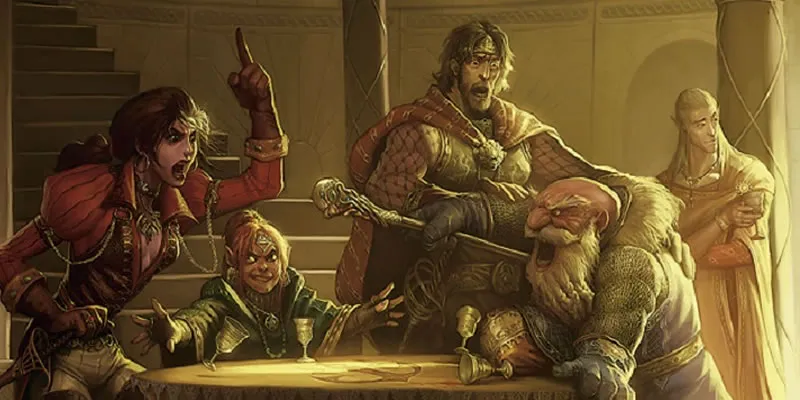Conflict at the table
A session I was playing in recently got me thinking about conflict during RPG sessions. More specifically, about conflicts between player characters and how that can bleed through into conflict between players. While the former can make for great stories, the latter can lead to the break down of your player base.

Why does conflict occur?
Players and their characters can have different goals. It is important to differentiate between these. For example, players might:
- have different ideas about where they want to take the story;
- have different ideas of how the game should be played;
- be looking to get very different things from the game.
Player conflict may be difficult or easy to mitigate depending on how it is approached. If both GMs and players are upfront about what they want then conflict can be resolved usually with some form of compromise. for example, if there is a rules conflict at the table, a quick ruling can nip things in the bud for the time being, while the actual rules can be looked up later on so as to prevent a long, drawn-out argument at the table. It can also be useful to have a chat with your players in advance of running a game so everyone is on the same page about what type of game they're going to be playing in. This way, everyone can decide ahead of time whether they want to play and are going to be invested in the game, as well as allowing everyone to voice opinions on what they would like to get out of it. Some Powered by the Apocalypse games almost intentionally have this conversation build into the game rules, allowing the players to insert and modify the game before it begins and during gameplay.
Characters on the other hand might:
- have different goals, which may go against other members of their party.;
- have differing alignments might push them in different directions;
- vocalise different approaches to achieving the same goal.
Character conflict is somewhat more complicated. While the player and character are intrinsically linked, that doesn't necessarily mean that they are one and the same. What my character wants, isn't necessarily what I would wish for in real life, depending on how I am roleplaying them and what the story is. For example, in an Ars Magica game that I am taking part in, I am playing a Criamon mage whose house is attempting something that may (or may not!) end with the destruction of the world. The other mages in our party are actively trying to prevent that from taking place. So our goals are at odds. However, as a player, I am not worried who in the end succeeds in their goals as long as a great story results.
A conflict between characters can become a big deal at the table when the conflict escalates to becoming among the players. Some players will see their character as an extension of themselves, and they are not wrong—they are a fantasy version of how we want to portray ourselves in game. Therefore, conflicts can feel personal and attacks against characters can be taken as attacks against a player. Some may also not deal with conflict well in real life, making in-game conflicts even more stressful. Plus, our everyday life and the events within in it can actively affect our moods and how we deal with these kinds of situations. I feel that there are measures that can be put in place to prevent such situations from occurring and these really come down to those involved being honest and open with their characters goals. Let's go back to the situation I mentioned at the start of this post...
In this particular case, we ended a session with our party having the opportunity to receive some special training, which at the time my character was most suited to take up in order to get the most benefit from. However, there was a question about whether he should be able to undertake it given his background (and also in a kind of meta-gaming way, what he might get up to with it, though the characters weren't especially aware of that). We ended with a conflict about the break out between characters, with mine wanting to undertake the training for his own reasons, and the others wanting to prevent him from doing so. When the next session started, I had a good plan for my character's goals. However, one of the players was very upfront about stating that they (as a player) did not enjoy conflicts in real life and did not want to get into it in game. This was fine! I had my goals and I laid my cards out on the table and let everyone know what my character's aims were. I made it clear that these were my character's goals and not my own, and that I would be fine however the situation played out. I think being upfront in this way also allowed me to distance myself a little bit from my character, rather than becoming too attached to them and their motives. As a result, the scene we played out exceptionally well and all the players were satisfied by the conclusion of the conflict with no arguments ensuing. My character did not achieve their goals but by discussing everyone's motives it allowed us to see where everyone stood and helped develop the scene and the overarching storyline.
While this is just a quick example from my own experience, I hope it provides a little food for thought and helps you think of ways to resolve similar conflicts that may escalate out of control at your own table.
